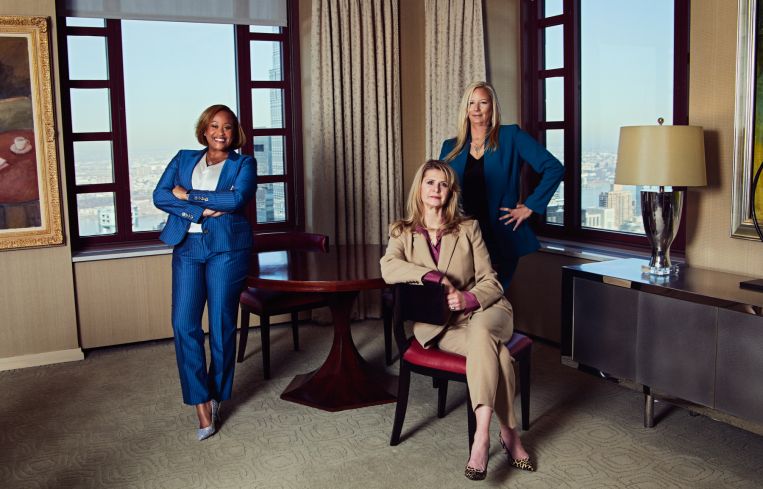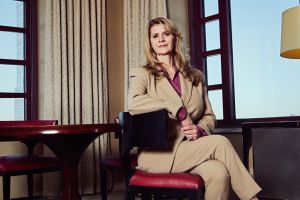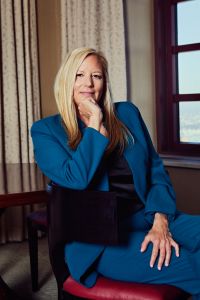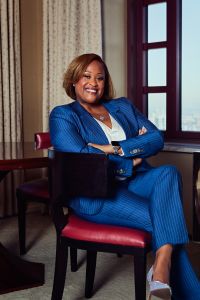Grey Matter: Three of Greystone’s Top Women Professionals Talk Shop
Lorie Hanson, Pharrah Jackson and Pamela LeVault describe their paths to Greystone, and their experiences as women in CRE.
By Cathy Cunningham April 1, 2025 10:00 am
reprints
In the mid-1990s, Lorie Hanson attended a meeting at the life company she worked for at the time. A client had flown in for the occasion, and she and her colleagues gathered in a large conference room. Hanson was the only woman, sitting at the end of a large table in the room.
The client looked down the table and said, “You know, I would really love a cup of coffee.”
The men in the room looked at each other, then at Hanson, waiting for her reaction. She too — for a nanosecond — was looking around the room, too. Then she realized the client was talking to her.
“My boss quickly said, ‘Actually, Lorie is one of our top-producing loan officers,’ ” Hanson recalls. “This poor gentleman’s face turned beet red and he said, ‘I am so sorry.’ ”
She stopped him.
“I said, ‘It’s OK. I’m not offended. I understand it was a mistake,’ ” she said.
To defuse the tension further, she said, “But you know what? A cup of coffee sounds really good. Why don’t we run down and grab us both a cup of coffee?” An assistant then jumped up and offered to do that on their behalf, but the awkward moment was graciously ended.
“I let him off,” Hanson said. “I didn’t have to do that, but I appreciated the apology and I knew I was up against the general perception of women [in the industry] — because back then when I went to conferences and meetings, people would often assume I was somebody’s assistant because I was a woman.”
While the commercial real estate industry has traveled a long way on the equity and equality trail since then, few would claim it has reached a perfect destination. Some companies are doing better than others — way better in fact. You can see it in their senior leadership, their team profiles, the professionals pushed forward to represent the companies in the public domain, and the diverse professionals these firms continue to attract.
Case in point: commercial real estate finance and investment firm Greystone. Of its 24 senior executives — including Stephen Rosenberg as CEO — nine (37.5 percent) are women and three are people of color.
Greystone’s women leaders are scattered across the U.S., but Commercial Observer chatted with three of them: Hanson, a director and relationship manager based in Spokane, Wash.; Pharrah Jackson, a vice president of affordable lending based in Atlanta; and Pamela LeVault, a senior vice president of agency production based in Los Angeles. Each woman charted her own unique path in achieving success, navigating an industry historically — and presently — dominated by men, and landing at a firm that values diversity, equity and inclusion, and which walks the walk behind its tagline “Where People Matter.”
‘Who’s this barracuda?’
Lorie Hanson joined Greystone in 2017, and today she’s a managing director and relationship manager, with fostering and nurturing relationships being her specialty.
She got her career start at Old Standard Life Insurance in 1990 working as a contract buyer at Metropolitan Mortgage & Securities, a division of the company. At the time, Metropolitan Mortgage was the nation’s largest buyer of commercial paper secured by real estate, including mobile homes, apartments and single-family residences. She worked her way up to the commercial real estate division of the company, and ended up one of its top three producers each year — and often No. 1.
“When I first started in commercial real estate, there were very, very few women, and when you attended the MBA conferences you very rarely saw women in production roles,” Hanson said of the Mortgage Bankers Association get-togethers back then. “Thankfully, that’s changed materially over the last several decades, which I’m very happy to see, because women bring a lot to the table.”
The gasps around Hanson in that conference room that day were in part because Hanson was known to be tough — the industry had conditioned her to be that way — and those around her knew she was “not afraid to speak my mind, ever.”
That caught some by surprise in the `90s, though.
“I had one guy on a conference call while I was at the life company ask, ‘Who’s this barracuda?!’ because I was saying ‘This is what we’re doing, and this is how we’re going to do it.’ I was certainly not your norm back then,” Hanson said. “I didn’t fit the mold of what most men in the industry expected. But I had a really strong mentor, somebody who I knew had my back. And, as long as I did a good job and I was working hard and I was ethical, he would always look out for me — and that empowered me.”

Hanson described that mentor, Mike Kirk, as “very firm, but also very fair,” and someone who appreciated a direct approach. “He’d tell me when I was screwing up and say, ‘You know, you’re doing this wrong,’ or ‘You’re looking at it the wrong way,’ or ‘You should have handled that differently,’ ” she said.
In her early days at the life company, Hanson would occasionally get frustrated with brokers she was working with who didn’t understand the deals she placed before them. One time Kirk overheard Hanson disciplining a broker and didn’t like her tactics.
“He called me into his office and said ‘Listen. What you said is right, but you’re dead right, because now you’ve shut the door on this person so hard they’re never going to be able to walk back through it. Leave a crack in the door so they can come back and save face,’ ”
Hanson recalls.
“I learned a lot from that conversation,” Hanson said. “And, at first, I was defensive. I felt like he was being too harsh on me. After I sat and thought about it, I thought ‘He’s right. I can be right, but if I’m dead right, then I miss the opportunity.’ There’s value in letting someone know when you don’t appreciate something, but you can do it in a way that is firm that also gives them grace. That was a very powerful lesson for me.”
Now, Hanson has found a happy medium of walking in a room, owning it, being kind, being gracious, and being confident but not arrogant, she said.
After Old Standard, Hanson spent time at a regional bank as a commercial loan officer but missed the ability to bring creativity to deals and languished under the feeling she was simply ticking boxes in transactions. A serendipitous chat with Tony Spaeth — a managing director focused on multifamily financings — led her to Greystone. Done with the banking side of the industry, she was seeking her next challenge and ready to color outside the box.
“The thing I learned about women, and myself in particular, is women often feel like they absolutely have to be 100 percent qualified to apply for a job, whereas men are more likely to say, ‘I’ll fake it till I make it. I’m going to apply. What do I have to lose? I’ll just see if I can get the job, and, if I can, I’ll figure it out.’ ”
The support of a solid new mentor was critical in Hanson making the jump from a bank to a nonbank. For Hanson, Chip Hudson, co-COO at Greystone, was that person.
“He has been a huge help to me and given me a lot of confidence,” Hanson said. “When I first came to Greystone, I had never worked in any of these types of lending platforms, so I had a lot to learn. Greystone is a very big company, and I’m here in little Spokane pressing my nose against the glass, trying to figure things out.”
Hanson said she struggled the first two years.
“I didn’t do as well as I was used to having done in the past,” she said. “That was really hard for me, because I’m a very competitive person, and so I was like, ‘Why am I not getting this? Why am I not getting some momentum going?’ I went to Chip, and he said: ‘Just keep doing what you’re doing. I’m going to give you time, but just keep going.’ ”
Hanson felt the weight lift from her shoulders then, and she decided not to focus on what she wasn’t yet achieving — but rather on the task in front of her, and getting it done.
“I said to myself, ‘Don’t be afraid of the risk, because there’s a lot of upside if you can figure this out. So, pull yourself up and let’s go,’ ” Hanson said. And she did.
‘That’s when it clicked’
Like Hanson, Pamela LeVault also got her start at a life company, SunAmerica. A Chicago native, she’s now spent the past 36 years in California. She oversees the firm’s West Coast agency loan production at Greystone, specializing in large Fannie Mae and Freddie Mac transactions, credit facility transactions and large loan pool transactions.
LeVault started in investment accounting, working on the bookkeeping for the mortgage loans that the life company did. She moved up the ranks at that same life insurance company, out of accounting and into commercial real estate.
LeVault also had male mentors in the early days.
“There just weren’t a lot of women around me to be mentors,” LeVault said. “So my mentors have been mainly men, and they were great. I try to be the mentor now as much as I can to women, because women need to know that they’re supported, and that someone wants to help them and help their career.”
After the life company, she went to Berkeley Point Capital where she was on the underwriting and credit side, ensuring for 18 years that Berkeley’s production was meeting all Fannie Mae and Freddie Mac requirements. She moved to Greystone in 2020, focused on the production side and managing producers.
“I’m on the front end of the deals now, but I think that career journey really set me up for success on this side, because now I have such a strong credit underwriting background and now managing the originators and really seeing what they do and feeling what they do and the pain of what they do,” she said.

For LeVault, she knew commercial real estate was the career for her “once I really experienced and understood it,” LeVault said. “You build your confidence by knowledge. And that’s once I became very knowledgeable in multifamily, specifically, and worked on several transactions, and I felt confident. That’s when it clicked.”
That awareness of her own personal journey helps her today in her own mentorship of women just starting their careers.
“Men are a little more aggressive than women when they’re just starting out,” LeVault said. “I see it all the time. Women, once they have enough knowledge in their role and gain their confidence, I see them soar and really take the lead. So, if you know that’s what it takes to build your confidence, I say try to learn everything you can about your product. Just know everything about it and you’ll soar.”
As Commercial Observer was going to press, LeVault was doing her own soaring, and starting a new role as a senior vice president of agency credit at the firm.
‘The room looks more like America’
Pharrah Jackson never wanted to be in commercial real estate, despite having the best role model and mentor right at home. Her mother, Lynn Hawkins, worked for Fannie Mae and, as a kid, Jackson spent time in Fannie’s offices, working in the file room during spring break.
“I said repeatedly, ‘I do not want to do this as a career,’ ” Jackson said and laughed. In truth, she wanted to be an FBI agent.
While she may have been reluctant to think about commercial real estate in the long term, Jackson secured several internships — thanks to her mom — where she got to see different sides of the business, and she found a job as a closing assistant.
“Closing was fun, but I knew it wasn’t for me, so I was always looking for something else,” Jackson said. “I love to be challenged, which is probably why I’m in affordable housing. You can’t get a lot more challenging than this.”
From the closing department, she went to asset management and servicing for a few years, and was hired as an analyst for Prudential as it was launching its affordable housing platform.
“It was the second time I got a really good peek behind the curtain at what affordable housing was, what it required,” Jackson said. “I was so intrigued and interested I really never looked back after that. I did go into credit. I focused on affordable housing for most of my career at Greystone to end up in my current position, which is relationship manager and originator dedicated to affordable housing.”
Affordable housing was what finally made the commercial real estate industry click for Jackson. “I’ve always wanted to help people. That’s really what it was about, taking care of people and helping people. And when I understood that that’s really what affordable housing is about — providing people homes and opportunities that they might not otherwise get — I understood that you could help people on such a large scale, and there was a way to do that from the seat that I was in.”
She leaned in. During her 21 years at Greystone, Jackson has held many roles, ranging from vice president of finance for Greystone Affordable Development to deputy chief underwriter for the dedicated affordable lending team. Over the years, she’s financed more than 1,000 affordable housing properties.

Eight years into her tenure at Greystone, Jackson went to work for a competitor very briefly. Three months later, Jackson’s brother died and she stepped in to raise his son.
“I went from being single, fun, doing whatever I wanted, to having a 10-year-old who had never lived in the States, and had never attended American school. He’s half-Japanese,” Jackson said. “At that point in his life, he was terrified if I wasn’t at home at night, because his dad left one day and never came home. As an underwriter, my job was to travel all over to site inspections, and he couldn’t sleep if I was away.”
Right about that time, Greystone launched its first sales desk, which helped originators structure their deals — a non-travel job opportunity. But something far bigger drew Jackson back to her Greystone family.
“When my brother passed, Greystone showed up for me as if I’d never left, bringing food to the house, calling and checking in, asking ‘What can we do? What do you need?’ They were my family, and with this opportunity I came home,” Jackson said.
Over the years, Jackson was lucky enough to have her mom by her side leading by example as she navigated the industry as another woman of color and rose through the ranks.
“I think [I had a different experience] because my mom was in the industry,” Jackson said. “She had a circle of peers that included women of color. I knew women who were managers and VPs, and it wasn’t until I probably reached the middle of my career when those women had retired or moved on and I realized there weren’t actually very many of us.”
While she started off her career in what she calls a “unique bubble,” she was aware of the scarcity of women and people of color at industry conferences — something that’s thankfully changing today, albeit slowly.
“Now, you go to these industry events and it’s more evenly distributed,” Jackson said. “The room looks more like America — this beautiful melting pot. I hope that we don’t lose the momentum and gains we’ve made there. But I think even with some of the [DEI] rollbacks industrywide that we’re seeing, things have changed. You’ve got people that are young in the industry that are bringing up the peers behind them, and, now that those doors have been opened, I don’t know that they’ll ever be shut again.”
In the meantime, Greystone is busy keeping its foot on the pedal with its own internal initiatives and content, such as the Greystone Women’s Network and the Glow CRE podcast — hosted by Jackson and LeVault.
“Doing the podcast and talking to all these women, we get to hear about their career paths,” Jackson said. “And I love knowing that there are more women than I thought there were. I definitely see a lot of women in management positions at Fannie Mae and Freddie Mac and in the development shops that I work with — because, historically, those have been very male dominated. Now you’re seeing women as the project team lead, as the CEO of the development shop, as a partner in the law firm. You’re definitely seeing them show up more.”
A lot of that progress comes down to people knowing that opportunities in commercial real estate are out there in the first place.
“When I was younger, if it weren’t for my mom, I wouldn’t have thought about commercial real estate,” Jackson said. “Now, I hear from a lot of the younger women in our office, and they’re hearing about it on their college campuses, they’re hearing about it from other new analysts that join the firm. So I think we’re doing a better job of educating and communicating more. We have more access to resources. You can open the podcast, you can go on LinkedIn that we didn’t have 20 years ago. And I think that’ll continue to spur more women being able to find these opportunities to step into these positions.”
And, the words of her family matriarchs stay with Jackson, always. She has a plaque with the words of wisdom her grandmother, the Rev. Ida May Wells, always told her: “Well-behaved women rarely make history.”
“She really challenged me to never be afraid to ask the question,” Jackson said. “She said, ‘So what if no one else is asking? So what if no one else is raising their hand or trying to do something that hasn’t been done? It doesn’t matter if you’re the first, just do it.’ Those words have always stuck with me, and have probably gotten me into trouble here and there, but they’ve probably saved me an equal number of times.”



